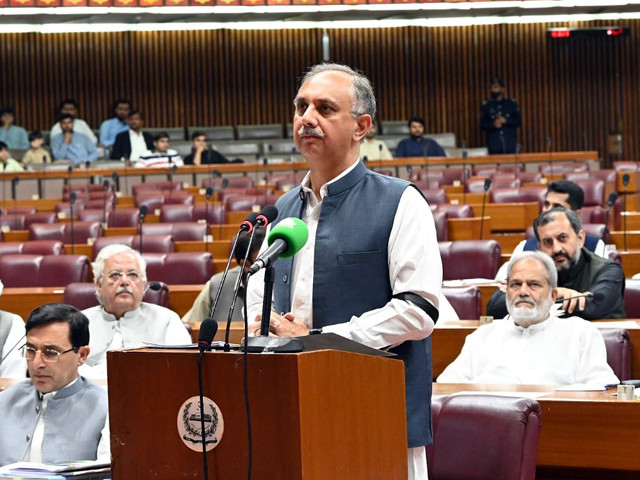
Leader of the Opposition in the National Assembly, Omar Ayub Khan, on Thursday denounced the budget for fiscal year 2024-25 as “economic terrorism” against the people as debate commenced on the finance bill.
Finance Minister Muhammad Aurangzeb presented his first federal budget last week, with a total outlay of Rs18.9 trillion. The budget aims for a modest 3.6% GDP growth and sets an ambitious Rs13 trillion tax collection target, raising taxes on salaried classes and removing tax exemptions for others.
Debate on the budget formally opened in the National Assembly today after the Eid ul Adha holidays, with its passage planned for 24 June. Ayub began the debate with strong criticism of the budget.
His speech was interrupted several times as he lamented alleged interference from the establishment.
“This budget is the story that began with ‘vote ko izzat do’ (respect the vote) and ended with ‘boot ko izzat do’ (respect the boot),” Ayub said, criticising the government.
“The budget is a fraud against the people. This is highway robbery against the people of Pakistan. This budget is, in actuality, economic terrorism against the people and the future of the country,” he added.
Ayub alleged that the budget was crafted with the help of “economic hitmen who want to shake the foundation of this country”.
He further claimed that these same “economic hitmen” were also involved in the PTI’s ouster from power in April 2022.
Ayub also criticised Prime Minister Shehbaz Sharif’s recent visit to China, highlighting that the Deputy Mayor received him, while the government portrayed it as a successful trip.
Ayub remarked, “A Deputy Mayor received our Prime Minister, and a bearded federal minister was busy making TikTok videos.”
Ayub accused a “fake Aristotle” of proposing the imprisonment of PTI’s founder for five years. “Is this country a banana republic?” he questioned, attributing the lack of investment in the country to ministers like Ahsan Iqbal.
He added, “The country faces an 8.5 trillion rupee budget deficit. Saudi Arabia, the World Bank, and others are unwilling to invest here. No new projects are included in this budget, only old ones will continue. Who will cover the 92% deficit?”
Ayub warned that financing 90% of the deficit through banks is akin to giving multiple glucose drips to a diabetic patient, predicting that this approach would lead to uncontrollable inflation and economic instability.
He noted that lending to the private sector has decreased, and demand for cement and other items has plummeted.
“The State Bank cut the interest rate by 1.5%, but the IMF and the State Bank did not agree. This interim measure will have more dangerous consequences. Printing new currency notes will only lead to a wave of inflation,” Ayub remarked.

